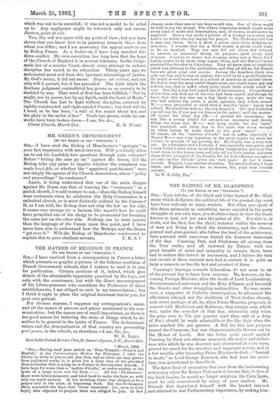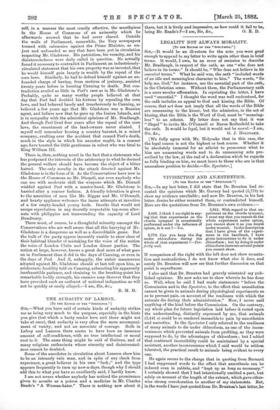THE BAITING OF MR. GLADSTONE.
[To TILE EDITOR OF THE "SPECTATOR?') SIR,—Yonr rebuke of the blind and bitter hatred of Mr. Glad- stone which disfigures the political life of the present day must have been welcome to many readers. But when you speak of this fierce animosity as something never equalled in the party struggles of our own time, you doubtless have in view the times known to men not yet past the prime of life. For this is, in truth, not the first, but the third, instance within the memory of men yet living in which the aristocracy, and the classes, genteel and semi-genteel, who follow the lead of the aristocracy, have pursued with rancorous hatred the foremost statesman of the day. Canning, Peel, and Gladstone, all sprung from the Tory ranks, and all endowed by Nature with too great breadth of mind and sympathy to remain there, have had to endure this hatred in succession, and I believe the first and second of these eminent men had to endure it in quite as large a measure as has the last and greatest of them.
Canning's leanings towards Liberalism do not seem to us of the present day to have been extreme. He, however, on be- coming Foreign Minister, after the death of Lord Londonderry, discountenanced autocracy and the Holy Alliance, and favoured the Greeks and other struggling nationalities. He was, more- over, a supporter of Catholic emancipation, he advocated the alleviation (though not the abolition) of West Indian slavery, and, worst perhaps of all, he, when Prime Minister, proposed, in concert with Huskissou and Robinson, that foreign corn, which was, under the corn-law of that day, admissible only when the price rose to 70s. per quarter (and then only at a duty of 20s.), should be made admissible at the like duty when the price reached 60s. per quarter. A Bill for this last purpose passed the Commons, but was characteristically thrown out by the House of Lords. But the bitter spirit raised against Canning by these not extreme measures, the malice and unfair- ness witri which he was deserted and obstructed at every turn, proved too much for his sensitive and impatient nature, and in a few months after becoming Prime Minister he died,—" hunted to death," as Lord George Bentinck, who had been his secre- tary, was accustomed to describe it. The fierce howl of execration that rose from the land-owning aristocracy when Sir Robert Peel made it known that, in face of
the Irish famine, he would no longer maintain the Corn Laws, must be still remembered by many of your readers. Mr. Disraeli first ingratiated himself with the landed interest and attained to real Parliamentary importance, by making him.
self, in a manner the most cruelly effective, the mouthpiece in the House of Commons of an animosity which he afterwards avowed that he had never shared. Outside the walls of Parliament, meanwhile, the Tory newspapers teemed with calumnies against the Prime Minister, as un- just and unfounded as any that have been put in circulation respecting Mr. Gladstone. His patriotism, his veracity, and his disinterestedness were daily called in question. He actually found it necessary to contradict in Parliament an industriously- circulated statement that his own property was so invested, that he would himself gain largely in wealth by the repeal of the corn laws. Similarly, he had to defend himself against an un- founded charge of having, from motives of jealousy, assisted twenty years before in hunting Canning to death. But con- tradiction availed as little in Peel's case as in Mr. Gladstone's. Probably, quite as many worthy people believed at that day that Peel had doubled his fortune by repealing the corn laws, and had behaved basely and treacherously to Canning, as believed a few years ago that Mr. Gladstone was a Russian agent, and believe now that he gave up the Ionian Islands, and is in sympathy with the atheistical opinions of Mr. Bradlangh. And though Peel lived four years after the repeal of the corn laws, the resentment of the land-owners never abated. I myself well remember hearing a country baronet, in a mixed company, exalting over the accident that caused Peel's death, much in the style in which his ancestor might, in a coarser age, have toasted the little gentleman in velvet who was fatal to King William III.
There is, then, nothing novel in the fact that a statesman who has postponed the interests of the aristocracy to what he deemed the general welfare should have become the object of a bitter hatred. The only novelty in the attack directed against Mr. Gladstone is in the form of it. As the Conservatives have now in the House of Commons no Mr. Disraeli, nor even anybody who can use with moderate skill the weapons which Mr. Disraeli wielded against Peel with a master-hand, Mr. Gladstone is harried after a coarser fashion. A friendly toleration is given to the amenities of men like Mr. Biggar and Mr. O'Donnell, and hearty applause welcomes the inane attempts at invective of a few empty-headed young lords. Insults that would not escape reprobation in any decently respectable tap-room alter- nate with philippics not transcending the capacity of Lord Dundreary.
There must, of course, be a thoughtful minority amongst the Conservatives who are well aware that all this harrying of Mr. Gladstone is a dangerous as well as a discreditable game. But the bulk of the party appear incurably unable to steer clear of their habitual blunder of mistaking for the voice of the nation the voice of London Clubs and London dinner parties. The nation at large, however, knows a great deal more of what goes on in Parliament than it did in the days of Canning, or even in the days of Peel. And if, unhappily, the unfair manceuvres adopted against Mr. Gladstone should at last tell upon him, as aristocratic hostility told on Canning, exhausting his apparently inexhaustible patience, and straining to the breaking-point his remarkable bodily strength, his enemies may discover that they have provoked such an outburst of national indignation as will not be quickly or easily allayed.—I am, Sir, &c., R. M. D.



































 Previous page
Previous page